
The family Phylliidae contains the extant true leaf insects or walking leaves, which include some of the most remarkably camouflaged leaf mimics (mimesis) in the entire animal kingdom. They occur from South Asia through Southeast Asia to Australia. Earlier sources treat Phylliidae as a much larger taxon, containing genera in what are presently considered to be several different families.

Phobaeticus is a genus of Asian stick insects comprising over 25 species. It includes some of the longest known insects, including Phobaeticus chani.
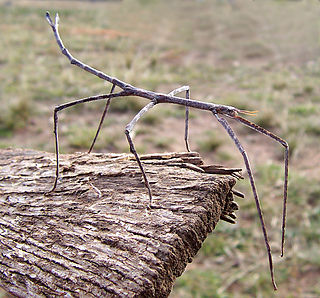
The Phasmatinae are a subfamily of stick insects in the family Phasmatidae. They contain at least three tribes; Bradley and Galil corrected the spelling to "Phasmatinae" and provides a key to tribes.
Hermarchus is a genus of very large stick insects within the order Phasmatodea and the tribe of Stephanacridini. Known species occur in New Guinea, Fiji, Australia, Philippines and New Caledonia.
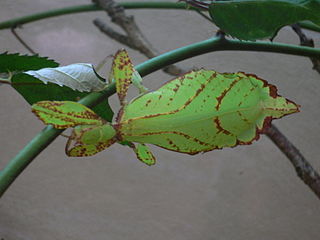
Phyllium is the largest and most widespread genus of leaf insects in the family Phylliidae. They can be found in the Indian subcontinent through to Southeast Asia and Australasia.

Necrosciinae is a subfamily of the stick insect family Lonchodidae, with its greatest diversity in South-East Asia.
Asceles is a genus from the stick insect family Diapheromeridae. Some of the species of Asceles have a distribution in Malaysia and Singapore.

Sosibia is an Asian genus of stick insects in the family Diapheromeridae and subfamily Necrosciinae.

Sipyloidea is a genus of stick insects of the family Diapheromeridae. The genus was described by Brunner von Wattenwyl in 1893.

Aschiphasmatidae are a family of stick insects belonging to the suborder Verophasmatodea; they can be found in Indomalaya.
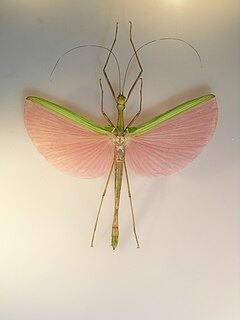
Marmessoidea is an Asian genus of stick insects in the family Diapheromeridae and subfamily Necrosciinae. The native range of species appears to be from India and South-East Asia to the Wallace line.
Oxyartes is a genus of stick insects in the family Diapheromeridae and subfamily Necrosciinae; species records are from India through to Indochina.
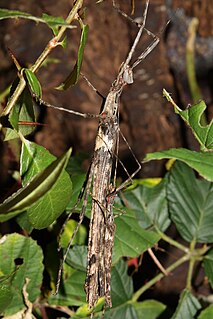
Trachythorax is an Asian genus of stick insects in the family Diapheromeridae and subfamily Necrosciinae. Species have been recorded from the Indian subcontinent, Indo-China, Malesia through to New Guinea.

Necroscia is an Asian genus of stick insects in the family Diapheromeridae and subfamily Necrosciinae. Species have been recorded from South-East Asia.
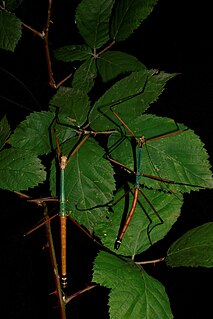
Lopaphus is an Asian genus of stick insects in the family Diapheromeridae and subfamily Necrosciinae. Species have been recorded from India, China and South-East Asia.

Pachymorphinae is a subfamily of stick insects in the family Diapheromeridae. Genera are primarily found in Africa, Asia and Australia.
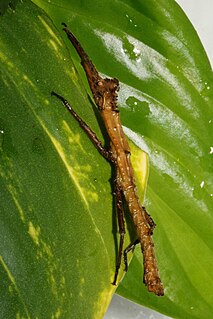
Pylaemenes is an Asian genus of stick insects in the family Heteropterygidae and subfamily Dataminae.

The Lonchodinae are a subfamily of stick insects in the family Lonchodidae found in: Australasia, Asia, Africa, Southern America and the Pacific.

Calvisia is a genus of stick insects in the subfamily Necrosciinae. Species are known to be distributed in temperate and tropical Asia.
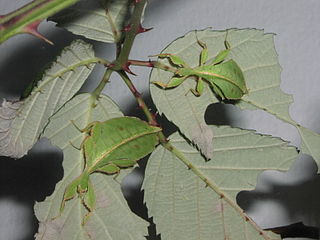
Cryptophyllium is a new (2021) genus of leaf insects in the tribe Phylliini. The current distribution map is probably incomplete, but includes southern China, Sri Lanka, Indo-China, Malesia and western Pacific islands.

















